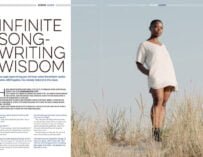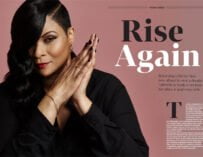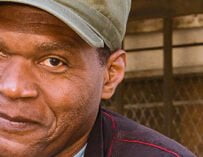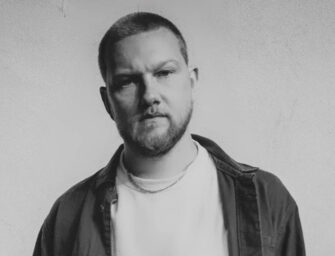
Mackwood: “I’ll be journaling a bunch of random ideas on my phone while also making a bunch of beats.” Photo: Michelle Janssen
The London-based artist discusses his innovative debut ‘Master Changes’ and the lessons he’s learned through years of songwriting and collaboration
Mackwood, the solo project of London-born Harry Ling, is reimagining jazz with his debut album Master Changes. The record reshapes the genre into something fresh and unexpected, reflecting Mackwood’s unique approach to music and songwriting. Growing up in Shepherd’s Bush, Mackwood’s music is shaped by both his multicultural background and years of formal music training. In Master Changes, he blends organic and electronic elements to create a modern, progressive style that bridges tradition and innovation. In this interview, Mackwood opens up about the songwriting behind the album, how his process has evolved over the years, and all the takeaways he’s learned along the way…
Read more interviews with songwriters
What are you working on right now?
“Right now, I am back in the studio making a bunch of beats, loops, and song starters for some of the producers and artists I work with. I’m also just happy to be back in the studio; getting behind the drum kit and spending some time there. There are so many songs, styles, and different ideas that I’ve been itching to put together, both in playing and elsewhere. It’s cool to be back doing that. It also means I’ve had some time to play more with the other projects I’m involved in. For example, I just went on a quick four-day Europe tour with the Levitation Orchestra, which was super fun. It’s always good to get out with those guys.”
How would you describe your songwriting process?
“I think the process can vary; it just depends on the song. If I really like the sound of something, it might inspire me to start writing straight to it. But actually, most of the stuff I’ve written for my own album came out of jotting down ideas, brainstorming, and spitballing onto my phone or notepad. Then I’d set those words to the music, kind of working the other way around. The more I think about it, that’s usually how it happens.”
So the lyrical inspiration comes first?
“I’m always writing and putting sounds together – like creating sketches and stuff. The way a song actually comes together is kind of a symbiosis of those two methods. I’ll be journaling a bunch of random ideas on my phone while also making a bunch of beats. If there’s any synergy between them, I’ll start overlaying things and seeing what sticks. It’s a pretty ‘Lego brick’ process. I heard someone describe it like that, which I think is spot on.”

Mackwood: “The best thing you can do in any kind of creative endeavour, specifically songwriting, is just write it.”
Has that always been your process or has it evolved over the years?
“Up until maybe the past year or two, I was making mostly instrumental music. I also loved grabbing little bits of sound bites – like audio from YouTube or other sources I was into back in my SoundCloud days. I think that approach has stuck with me in a lot of ways. Collaging is such a fun way to see what will come out of a track. So many of my favourite producers are masters of that.
“That process is still a part of my approach, even though, for this album, I wanted to keep it all in one place and do it myself. I think the biggest change has been stepping into more of a writer’s mentality rather than a beatmaker’s. But I don’t think that part of me has ever really left. It’s still a big part of who I am.”
When you were making this album, what or who was the biggest inspiration behind it?
“Crazy question. There are so many answers to it. I started writing all the music for this project around 2020, during lockdown, when we were all cooped up. It gave me the chance to listen to a ton of music. I’m into jazz as much as I’m into dance music, punk, hip-hop, reggae – kind of everything. But “everything” isn’t a great answer to your question, so I should probably narrow it down.
“Harmonically, on a lot of the tracks, I was digging into the work of people like Joel Ross, Ambrose Akinmusire, and Gerald Clayton – jazz musicians I’ve always admired. They’re rooted in the American jazz tradition, specifically coming out of Blue Note Records, with influences from New York, LA, and Texas.
“Rhythmically, though, a lot of my music is much more rooted in UK sounds. The same goes for the sound design. That influence definitely comes from artists like Chase & Status, Kode9, Dub Phizix, and maybe Noisia. Even some of the sound design elements might lean into the hyperpop or PC Music sphere, with inspiration from people like A.G. Cook and SOPHIE. It’s all these different pieces coming together that shape the sound.”
You mentioned that you started working on the album during lockdown, so was this a project you mostly worked on from home?
“Lockdown was a funny one because my home studio was the living room in my flat, which was cool. I was sitting on the floor with my laptop, trying not to get pins and needles from sitting cross-legged for hours. As soon as lockdown started lifting, I had the opportunity to start putting things together with musicians and producers I really like working with. That was exciting because, up until then, I had pretty much only made stuff on my laptop ‘in the box’. I was functioning as both a producer and a drummer, but separately.
“Once restrictions eased, I started jamming with musicians. There’s a studio in East London called Limehouse, specifically a place called Stable Bone, where I started organising improvised jam sessions with people I admire. They even had the facilities to film it, which was great. I put together these totally ad hoc improv sessions while also continuing my usual process of composing and writing.”

Mackwood: “Having an element of play in what you’re doing is one of the most energising things you can do.” Photo: Michelle Janssen
Then what happened?
“By the time lockdown fully lifted, I had begun working with the guys at 5dB, the label I’m now signed to. At that point, I’d been recording audio from those jam sessions and reworking it to reflect what I imagined my music would sound like when played live. By the time I started collaborating with 5dB, I’d written everything down on sheet music, like you would for a jazz band, with all the notation, chords, and arrangements fully laid out.
“At that stage, I realised I could combine my production workflow and writing process with a set band of musicians. It was this beautiful blend of working from home, getting into studios just for fun and collaboration, and then transitioning to a phase where I was bringing fully composed pieces into a band context.”
Did getting signed during that process change the direction of the album at all?
“The guys at 5dB have a really interesting history and setup. They first started out simply as a studio, and as the studio grew, they began bringing more and more people into the mix, gradually developing an administrative side to what they were doing. Eventually, they realised there were so many musicians coming through and creating music that it made sense to start showcasing these artists.
“They began doing more of the filming and live session work I mentioned earlier, and from there, it seemed natural for them to evolve into a label. With so many musicians road-testing their material in the studio, the transition just clicked.”
“For my own work, I had the pleasure of collaborating with some incredible engineers. One of them was Javier Weyler, an amazing producer and drummer who used to play with the band Stereophonics. He brought together this crack team of engineers who co-produced my music with me. That was such a cool experience because I came into it with more of an ‘in-the-box’ mindset – where I’d just pull up a bunch of sounds and plugins in my software to see what happened.
“But when I got into the room with those guys, it was a totally different experience. For example, if you’re recording drums live, you have to decide which mics to use and what pieces of equipment to run them through to get the exact sound you want. They really pushed me to embrace a more traditional studio setup, which was amazing. It taught me a lot about translating the way I typically make music into a collaborative, live studio environment. It was definitely a learning curve, but it’s given me a much stronger grasp of how to adapt my workflow to a room full of people and professional studio gear.”
Are there any lyrics on the album that stick out to you the most?
“There are a few moments that stand out to me. One of the parts I really enjoyed writing was the first verse of the song Habits with Quinn Oulton. That verse feels really intimate – well, the whole song is pretty intimate emotionally – but especially that first section. I handled the main brunt of the writing there, and it felt like I was really talking to someone as I was writing it. It was like I was spilling my guts a bit.
“There’s this repetition in the verse that doesn’t even rely on a strict rhyme scheme. It’s more like I’m just pouring out my thoughts, but in a rhythmically coherent way. I’ve never really done the poetry thing or written verse in that traditional sense, but this felt like a stream-of-consciousness, flow-state way of getting the point across – conveying that emotional intensity and playing with repetition. In a way, it felt a little like how I might approach playing drums in certain contexts.
“Another standout moment from that same song is a section Quinn wrote: ‘Bent myself into bridges, cried rivers, feet across.’ When I first heard it, I was just like, ‘Whoa’ . The imagery hit me immediately.”
What did you learn about songwriting through this project?
“You know, songwriting, composing, and even playing – it’s all about trying to embrace a bit more abandon and be a little more playful. That spitballing thing of journaling onto my phone as I go was a really big step in my process. I don’t see many people doing it, other than songwriters, who often have a notebook or a folder on their phone or device where they just spitball ideas, journal, sketch, and then see what sticks.
“In contrast, many of the musicians I know and admire often talk about their strict practice regimes, the exercises they’re working on, or the specific techniques they’re developing. Songwriters, however, tend to have a more intuitive approach to their process and growth. It was really cool to try and inject some of that more fluid, intuitive mindset into what I was doing.”
Based on your experience writing this album, what is your best piece of songwriting advice?
“I think exactly that. I hope I don’t sound like a broken record just saying “spitballing,” but if you go into it, let’s say you want to write a song, where are you going to start? Do you know what it’s about? Do you not know what it’s about? Regardless, I think the best thing you can do in any kind of creative endeavour, specifically songwriting, is just write it. Just write anything. If you don’t know what to write, write something down. If you do know what to write, keep going until you feel like your inspiration has run out a little bit, and then just play with it.
“Having an element of play in what you’re doing is one of the most energising things you can do, because you’re not setting yourself a goal and then trying to reach it. You’re letting yourself be present, trial-and-error, road-testing… I’d say you’ve always got the backspace button. It’s better to end up with too much than too little.”































Related Articles